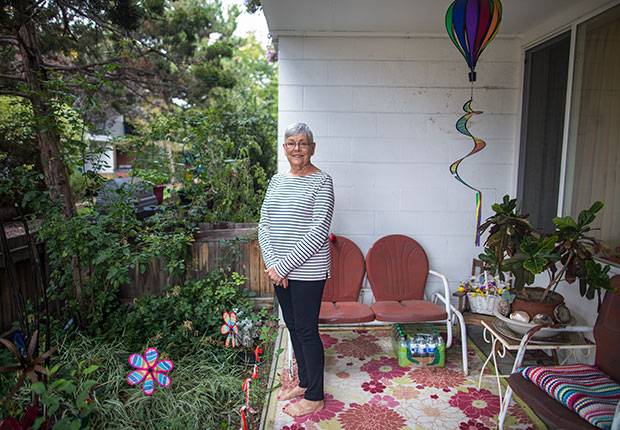AARP Eye Center

By Cynthia Pasquale
When Phyllis Watkins became a full-time caregiver for her 93-year-old mother, Marilyn, she thought it would be a short-term proposition. Doctors had said the cancer diagnosis meant Marilyn would live only a few months. So Watkins, a retired registered nurse, moved her mother from Oklahoma to a Lakewood condominium.
Six months later, she moved in with Marilyn to provide 24-hour care for the ailing woman, who is nearly blind and susceptible to falls and broken bones. That was more than a year ago.
“I pretty much have devoted my whole life to Mom,” said Watkins, 73. She doesn’t travel anymore or go to exercise classes, and her schedule is dependent on her mother’s needs. “You just have to say to yourself that this is the way it is going to be. You feel selfish if you want your life to be different, because in order for your life to be some other way, it means your mother is going to die. And that’s not what you really want.”
Watkins’ emotional struggle is indicative of what many experience and is an inevitable part of caregiving, as are physical, psychosocial, spiritual and financial challenges. To offer insight to caregivers, AARP Colorado is releasing 40 podcasts addressing issues common to people who commit to the role. The podcasts are accessible on iTunes and Google Play, and at aarp.org/co.
Titled Care-FULL Conversations, the podcasts are hosted by Jane Barton, AARP Colorado’s caregiving ambassador, who has a professional and personal background in caregiving and writes a blog on the topic. The eight- to 10-minute podcasts are casual, not academic, Barton said, and include topics such as advance care planning, compassion fatigue, caregiver stress and collaborative models of care.
‘Resistance to assistance’
“I talk about the experiences of being a caregiver and care receiver. My goal for every podcast is that people hear at least one thing that will be beneficial to them over the course of their journey,” Barton said.
New caregivers need to understand the ailing person’s diagnosis and the level of care that will be needed in the short and long terms. They must then consider issues such as living arrangements, financial needs and the available social support systems.
As Watkins now knows, no matter how much a person prepares, caregiving requires constant adaptation, which is one reason it can be so draining, Barton said. “Just when a family thinks everything is under control, something changes.”
Barton said the stories she shares—some personal and others gleaned from years of talking with caregivers—will enable people to “take the next step and realize they aren’t the only people who get frustrated or are afraid of how the journey will unfold.”
One of the biggest challenges for caregivers is what Barton calls “resistance to assistance. People assume the lion’s share of responsibilities because they think they have to or are supposed to, or have no one else to involve.
“Why is it so hard for most of us to ask for help or receive help? It has a lot to do with control—the belief that no one can care for my loved one as well as I can,” she said.
Watkins gets a few hours of respite from cooking, cleaning and everything else each week when her long-term boyfriend or her daughter drops in to help. And to help her mother shower, a hospice worker also visits three times a week, which Watkins said, “takes a great load off” her shoulders.
“Having that sort of help makes a big difference and gives my mother someone else to talk to.”
Cynthia Pasquale is a writer living in Denver.























































